仁爱英语初中英语构词法归纳
u1-t3 仁爱九年级英语重点短语、句子汇总及语法精粹
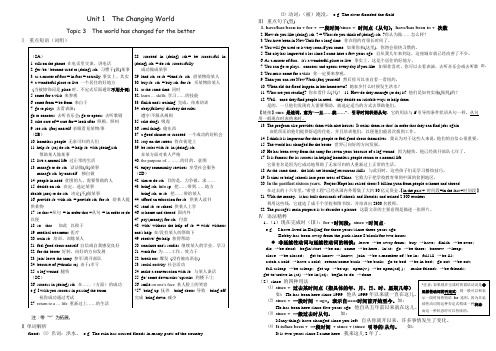
Unit 1 The Changing WorldTopic 3 The world has changed for the better Ⅰ. 重点短语(词组)注:带“*”为拓展。
Ⅱ.单词解析flood:⑴名词:洪水。
e.g. The rain has caused floods in many parts of the country.⑵动词:(被)淹没。
e.g. The river flooded the field. Ⅲ. 重点句子(型)1. have/has been in + for + 一段时间/since + 时间点(从句);have/has been to + 次数2. How do you like (doing) sth. ? = What do you think of (doing) sth. ?你认为做……怎么样?3. Y ou have been in New Y ork for a long time. 你在纽约有很长时间了。
4. Y ou will get used to it very soon if you come. 如果你来(这里),你将会很快习惯的。
5. The city has improved a lot since I came here a few years ago. 自从我几年来到这,这座城市就已经改善了不少。
6. As a matter of fact,it's a wonderful place to live. 事实上,这是个居住的好地方。
7. Y ou can go to plays,concerts and operas every day if you like. 如果你喜欢,你可以去看表演,去听音乐会或去听歌8. Y ou must come for a visit. 你一定要来参观。
9. Then you can see New Work (for) yourself. 然后你可以亲自看一看纽约。
仁爱版七年级英语上册Unit3知识点总结

仁爱版七年级英语上册Unit3知识点总结Unit 3: Getting XXXTopic 1: Basic Sentence Structures1.Asking for XXX:Excuse me。
could you please tell me your name?Sure。
my name is Jane.2.Asking for help:Could you help me with it?No problem.3.Asking about language proficiency:Does XXX?Yes。
he does./No。
XXX.4.Asking about the content of a letter:What does he say in the letter?5.Describing friendship:Jane。
Sally。
and I are good friends.6.Describing mutual help:We often help each other.7.Expressing different degrees of liking:Many students in our class like English a lot。
but I like it a little.What about you。
Sam?No。
I don't like English at all.Useful Phrases:9.Pen palXXX11.A lot12.Not。
at all13.Each other14.A little15.Very much16.A lot of17.Every dayPersonal Pronouns and Simple Present XXXXXX or things。
and they have ns in person。
singular or plural。
仁爱英语九年级上U1T1语言点详解
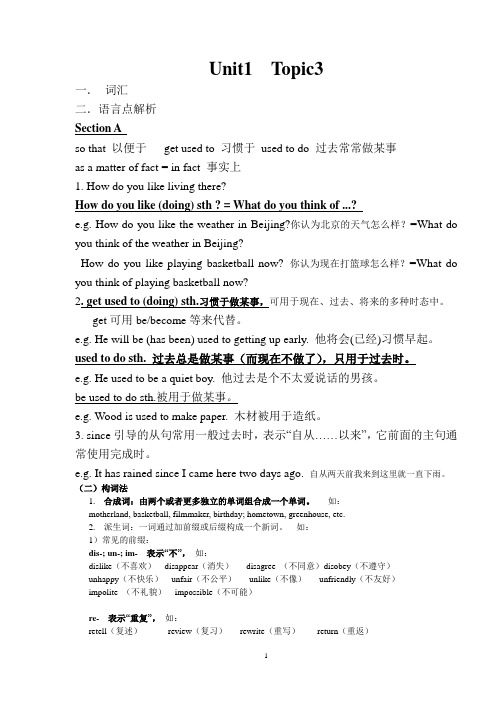
Unit1 Topic3一.词汇二.语言点解析Section Aso that 以便于get used to 习惯于used to do 过去常常做某事as a matter of fact = in fact 事实上1. How do you like living there?How do you like (doing) sth ? = What do you think of ...?e.g. How do you like the weather in Beijing?你认为北京的天气怎么样?=What do you think of the weather in Beijing?How do you like playing basketball now? 你认为现在打篮球怎么样?=What do you think of playing basketball now?2. get used to (doing) sth.习惯于做某事,可用于现在、过去、将来的多种时态中。
get可用be/become等来代替。
e.g. He will be (has been) used to getting up early. 他将会(已经)习惯早起。
used to do sth. 过去总是做某事(而现在不做了),只用于过去时。
e.g. He used to be a quiet boy. 他过去是个不太爱说话的男孩。
be used to do sth.被用于做某事。
e.g. Wood is used to make paper. 木材被用于造纸。
3. since引导的从句常用一般过去时,表示“自从……以来”,它前面的主句通常使用完成时。
e.g. It has rained since I came here two days ago. 自从两天前我来到这里就一直下雨。
(二)构词法1.合成词:由两个或者更多独立的单词组合成一个单词。
仁爱版九年级英语构词法小结(精选五篇)

仁爱版九年级英语构词法小结(精选五篇)第一篇:仁爱版九年级英语构词法小结Class One,Grade NineZhexiang Junior High School中考倒计时254天(6月18日)好的学习态度是奇迹发生的前提仁爱版九年级英语(上)构词法小结Topic3 The world has changed for the better.Section A 1.派生词(1)前缀① 前缀:dis-, un-, im-, non-等表示否定。
obey→disobey;fair→unfair;possible→impossible;non-stop (不停留的)② 前缀:re-附在动词之前,表示“重复”,“再做”之意。
write→rewrite;tell→retell(2)后缀① 后缀-er或-or:这类词构成做某事情的人或工具、器皿等的总称。
c ook→cooker;teach→teacher;farm→farmer;clean→cleaner;v isit→visitor;invent→inventor;educate→educator ② 后缀-ist:通常指在某方面有特长的人。
science→scientist;art→artist③ 后缀-ion,-ment:加此后缀后,动词转变为抽象名词或集体名词。
invent→invention;move→movement④ 后缀-ness,-ty:加此后缀后,形容词变成抽象名词,表示性质、状态、程度等。
busy→business;ill→illness;safe→safety ⑤ 后缀-able:此后缀附在动词或名词后面构成形容词,表示“可……的”,“能……的”。
enjoy→enjoyable;reason→reasonable ⑥后缀a)后缀-ful:加在名词后面构成形容词,表示“充满……”,“有……性质”,“有……倾向”。
care→careful;use→useful;hope→hopeful b)后缀-less::加在名词后面构成形容词,表示“无……”,“没有……”等。
仁爱版初中英语知识框架
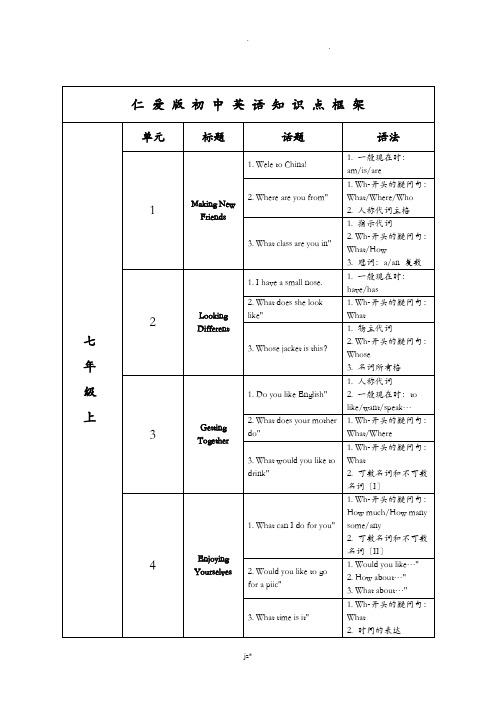
1. 指示代词
2. Wh-开头的疑问句:What/How
3. 冠词:a/an 复数
2
Looking Different
1. I have a small nose.
1. 一般现在时:have/has
2. What does she look like"
3. Let's celebrate!
1. 复习
八 年 级 上
单元
标题
话题
语法
1
Sports and Games
1. Are you going to play basketball"
1. Be going to构造的一般将来时
2. Would you mind teaching me"
1. Would/Do you mind doing sth"
1. 过去进展时
4
Our World
1. Plants and animals are important to us.
1. 形容词的比拟级和最高级
2. Are you sure there are UFOs"
1. Be sure确信
3. The workers used live models, didn't they"
3. Which sport will you take part in"
1. Will构造的一般将来时
2
Keeping Healthy
1. You'd better go to see a doctor.
1. 情态动词〔1〕
仁爱英语九年级 U1T3知识点

九年级unit 1 考点解析Topic 3一、词组Section Aget used to 对........习惯used to be/do 过去曾经是/过去常常as a matter of fact 事实上on the phone 在电话里go to plays 去看表演go to concerts/operas 去听音乐会/歌剧)come for a visit 来参观Section Bhomeless people 无家可归者 a normal life 正常的生活in need 在困难时,在贫困中decide on 决定,选定provide sb with sth 提供某人某物feel good about 对.....感觉良好not only....but also 不仅...而且in order to 为了thanks to 由于,幸亏because of 由于medical treatment 治疗,医疗Section Cbe famous for 因....而著名return to 回到,恢复到at the same time 同时obey strict rules 遵守严格的规定take drugs 吸毒,吃药talk about 谈论receive a good education 接受良好教育have/live a happy life 过快乐的生活at home and abroad 国内外pay for 为....而付钱Project Hope希望工程without the help of 没有...的帮助make a speech 发表演讲二、语言点详解Section A1.how do you like sth / doing.....?=what do you think of..... 你认为(做).....怎么样?动名词作like的宾语。
你认为长城怎么样?2.get(be) used to 意为“习惯于”。
(完整版)初中英语常用构词法归纳
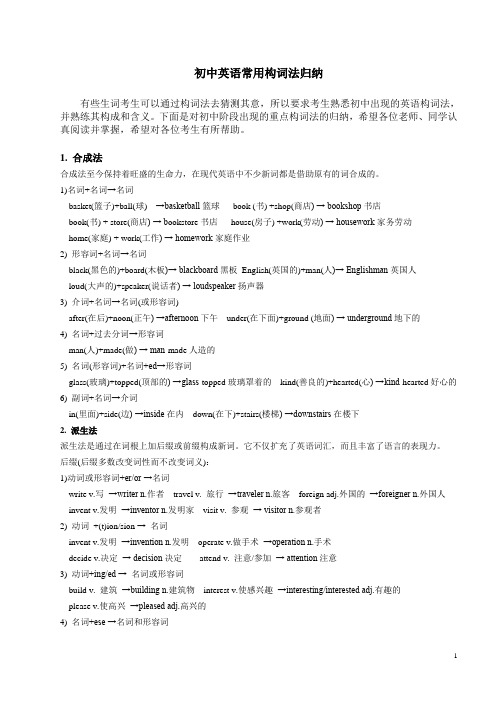
初中英语常用构词法归纳有些生词考生可以通过构词法去猜测其意,所以要求考生熟悉初中出现的英语构词法,并熟练其构成和含义。
下面是对初中阶段出现的重点构词法的归纳,希望各位老师、同学认真阅读并掌握,希望对各位考生有所帮助。
1. 合成法合成法至今保持着旺盛的生命力,在现代英语中不少新词都是借助原有的词合成的。
1)名词+名词→名词basket(篮子)+ball(球)→basketball篮球book (书) +shop(商店) → bookshop书店book(书) + store(商店) → b ookstore书店house(房子) +work(劳动) → housework家务劳动home(家庭) + work(工作) → homework家庭作业2) 形容词+名词→名词black(黑色的)+board(木板)→ blackboard黑板English(英国的)+man(人)→ Englishman英国人loud(大声的)+speaker(说话者) → loudspeaker扬声器3) 介词+名词→名词(或形容词)after(在后)+noon(正午) →afternoon下午under(在下面)+ground (地面) → underground地下的4) 名词+过去分词→形容词man(人)+made(做) → man-made人造的5) 名词(形容词)+名词+ed→形容词glass(玻璃)+topped(顶部的) →glass-topped玻璃罩着的kind(善良的)+hearted(心) →kind-hearted好心的6) 副词+名词→介词in(里面)+side(边) →inside在内down(在下)+stairs(楼梯) →downstairs在楼下2. 派生法派生法是通过在词根上加后缀或前缀构成新词。
它不仅扩充了英语词汇,而且丰富了语言的表现力。
后缀(后缀多数改变词性而不改变词义):1)动词或形容词+er/or →名词write v.写→writer n.作者travel v. 旅行→traveler n.旅客foreign adj.外国的→foreigner n.外国人invent v.发明→inventor n.发明家visit v. 参观→ visitor n.参观者2) 动词+(t)ion/sion → 名词invent v.发明→invention n.发明operate v.做手术→operation n.手术decide v.决定→ decision决定attend v. 注意/参加→ attention注意3) 动词+ing/ed → 名词或形容词build v. 建筑→building n.建筑物interest v.使感兴趣→interesting/interested adj.有趣的please v.使高兴→pleased adj.高兴的4) 名词+ese →名词和形容词China n.中国→Chinese n.中国人adj.汉语的Japan n. 日本→Japanese n. 日本人adj.日语的5) 名词或动词+ ful →形容词help n. 帮助→helpful adj有帮助的use n. 使用→ useful adj. 有用的6) 动词+able → 形容词enjoy v. 喜欢→enjoyable. adj.有趣的forget v. 忘记→ forgettable adj. 容易被忘的7) 名词+en →形容词wool n. 羊毛→woolen adj.羊毛的wood n. 木材→wooden adj.木制的8) 名词+y → 形容词sun n. 太阳→sunny adj.阳光灿烂的cloud n. 云→ cloudy adj.多云的luck n. 运气→ lucky adj.运气好的noise n. 响声→noisy adj.喧闹的smell n. 味道,气味→smelly adj. 有使人难受的气味的,臭的9)形容词+ly →副词happy adj 高兴的→happily adv. 高兴地wide adj. 宽广的→widely adv. 宽广地10) 形容词+ness → 名词good adj. 好的→goodness n.好意kind adj. 善良的→kindness n.和蔼happy adj. 开心的→happiness n. 开心11) 名词+ly →形容词friend n. 朋友→friendly adj.友好的love n. 爱→lovely adj.可爱的12) 名词+ less →形容词(词义与加ful相反)care + less →careless adj. 粗心的help + less →helpless adj. 无助的13) 名词+ al →形容词nation n.民族→national adj. 国家的education n.教育→educational adj.教育性的tradition n. 传统→traditional adj. 传统的14) 名词+ ist →名词science n.科学→scientist n.科学家piano n.钢琴→pianist n.钢琴家tour n. 旅游,观光旅行→tourist n. 旅行者,观光客15) 动词+ ment →名词develop v.发展→development n.发展agree v.同意→agreement n. 同意,一致, 协议argue v. 争论,辩论→argument n. 争吵;论据16) 形容词+ ity →名词able adj. 能够的→ability n.能力,才能possible adj.可能的→possibility n. 可能性real adj. 真的,真实的→reality n. 现实,实际,真实17) 名词+ous →形容词danger n.危险→dangerous adj.危险的18) 名词+ish →形容词fool n. 愚人,傻瓜→foolish adj.愚蠢的,傻的child n.孩子→childish adj.孩子气的,幼稚的book n. 书→bookish adj.书生气的19) 形容词或名词+en →动词wide adj. 广泛的,宽阔的→widen v. 弄宽sharp adj. 锋利的,急剧的→sharpen v. 使...尖锐,变为锐利fright n. 惊吓→frighten v. 使惊吓, 害怕,惊恐20) 名词或形容词+ify →动词beauty n.美丽→beautify v. 美化,变美,修饰simple adj.简单的→simplify v. 简化,使单纯21) 形容词+ize →动词real adj. 真的,真实的→realize v.了解, 实现, 察觉;领悟memory n.记忆力→memorize v.记忆22) 动词+tive →形容词act v. 行为,行动→active adj. 积极的,主动的attract v. 吸引,有吸引力→attractive adj. 有吸引力的,引起注意的23)动词+ess →名词(女性)host v.主持,做东→hostess n. 女主人act v. 行动,扮演→actress n. 女演员wait v.等待,等候→waitress n. 女侍者,女服务员前缀(前缀一般只改变词的意思而不改变其词性):1) un- (不,非,表示否定,形容词前缀)happy (高兴的) → unhappy(不高兴的)like (像) → unlike(不像)2) im- (不,无,非,表示否定,形容词前缀,常用在p, b, m开头的单词前)possible (可能的) → impossible(不可能的)polite → impolite3) in- (不,无,非,表示否定,形容词前缀)active →inactivecomplete →incomplete 不完全的4) dis-(不,非,表示否定,动词或形容词或名词前缀)honest →dishonest agree →disagreeadvantage优势→disadvantage不利,不利条件5) mis- (表示错误)understand →misunderstand (误解)mistake (错误), misuse (误用)6) re- (再,重复)tell 叙述→ retell复述build 建筑→ rebuild 重建write →rewrite7) bi- (两个、双边的)bicycle 自行车, bicolor 双色的8) inter- (相互、交互、在一起)interview, international, internet9) tele- (远)telephone, television10) kilo- (千)meter 米→kilometer 公里,千米gram 克→kilogram 千克11) micro- (微,小)microwave oven 微波炉microcomputer 微型电脑12) sub- (下,次,亚,准,副)subway 地铁,sub-zero 零度以下的,subcollege 准大学程度的,subworker 助手,副手,suboffice 分办事处,3. 转化法在英语发展过程中,由于词尾的基本消失,衍生出一种新的构词法——转化法,而无须借助词缀,就实现词类的转化。
仁爱英语初中英语构词法归纳
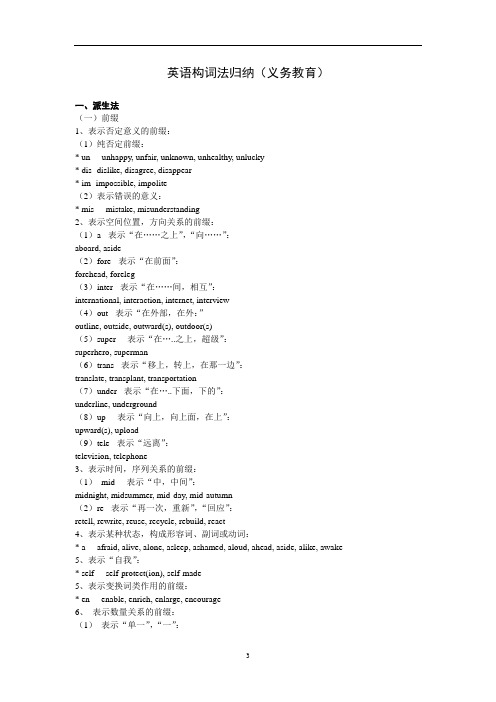
英语构词法归纳(义务教育)一、派生法(一)前缀1、表示否定意义的前缀:(1)纯否定前缀:* un- unhappy, unfair, unknown, unhealthy, unlucky* dis- dislike, disagree, disappear* im- impossible, impolite(2)表示错误的意义:* mis- mistake, misunderstanding2、表示空间位置,方向关系的前缀:(1)a- 表示“在……之上”,“向……”:aboard, aside(2)fore- 表示“在前面”:forehead, foreleg(3)inter- 表示“在……间,相互”:international, interaction, internet, interview(4)out- 表示“在外部,在外:”outline, outside, outward(s), outdoor(s)(5)super- 表示“在…..之上,超级”:superhero, superman(6)trans- 表示“移上,转上,在那一边”:translate, transplant, transportation(7)under- 表示“在…..下面,下的”:underline, underground(8)up- 表示“向上,向上面,在上”:upward(s), upload(9)tele- 表示“远离”:television, telephone3、表示时间,序列关系的前缀:(1)mid- 表示“中,中间”:midnight, midsummer, mid-day, mid-autumn(2)re- 表示“再一次,重新”,“回应”:retell, rewrite, reuse, recycle, rebuild, react4、表示某种状态,构成形容词、副词或动词:* a- afraid, alive, alone, asleep, ashamed, aloud, ahead, aside, alike, awake 5、表示“自我”:* self- self-protect(ion), self-made5、表示变换词类作用的前缀:* en- enable, enrich, enlarge, encourage6、表示数量关系的前缀:(1)表示“单一”,“一”:* uni- uniform(2)表示“二,两,双”:* bi- bicycle(3)表示“百,百分之一”:* centi- centimeter(4)表示“千,千分之一”:* kilo- kilometer, kilogram(5)表示“微小、微型”:* mini- minibus, miniskirt(二)后缀1、名词后缀:(1)具有某种职业或动作的人:* -an, -ian, -ician 表示“……地方的人,精通……的人”American, Asian, Australian, Russian, Italian , librarian, musician* -ant,-ent 表示“……人”servant, assistant, agent, student* -eer 表示“从事于……人”engineer, volunteer* -er 表示“从事某种职业的人, 某地区,地方的人”singer, driver, writer, speaker, traveler * -or 表示“……者”doctor, operator, actor, visitor, inventor, educator* -ar, -ary 表示“……的人, 从事……的人”scholar, beggar, secretary*-ese 表示“……国人,……地方的人”Chinese, Japanese* -ess 表示“阴性人称名词”actress, hostess* -ist 表示“从事……研究者,信仰……主义者”dentist, artist(2)构成具有抽象名词的含义:* -age 表示“状态,行为,身份及其结果,总称”courage, marriage* -ance, -ence 表示“性质,状况,行为,过程,总量,程度”importance, appearance, performance, difference, absence, presence* -bility 表示“动作,性质,状态”ability, possibility, probability* -dom 表示“等级,领域,状态”freedom, wisdom* -ery, -ry 表示“行为,状态,习性,性质”bravery, discovery* -hood 表示“资格,身份, 年纪,状态”childhood, girlhood, boyhood* -ing 表示“动作的过程,结果”building, writing, learning* -ion, -tion, -ation, -ition, -sion 表示“行为的过程,结果,状况”action, invention, pronunciation, examination, decision* -ment 表示“行为,状态,过程,手段及其结果”movement, agreement, development * -ness 表示“性质,状态,程度”kindness, illness, happiness* -ship 表示“情况,性质,技巧,技能及身份,职业”relationship, friendship* -th, 表示“动作,性质,过程,状态”truth, growth , youth2、形容词后缀:(1)带有“属性,倾向,相关”的含义:* -able, -ible comfortable, enjoyable, sociable, terrible* -al natural, national* -ant, -ent important, excellent* -ing(表示特征:令人觉得)moving, interesting, exciting* -ed (表示情绪:觉得)pleased, interested, surprised* -ive active, creative, expensive(2)表示“相象,类似”的含义:* -y cloudy, sunny, windy, rainy, foggy, healthy, dirty, lucky, noisy* -ly friendly, lonely, lovely, lively(3)表示“充分的”含义:* -ful beautiful, wonderful, helpful, useful, careful* -ous dangerous, humorous(4)表示由某种物质形成,制成或生产的含义:* -en wooden, golden(5)表示方向的含义:* -ern eastern, eastern, western, southern, northern, southeastern, northwestern* -ward downward, forward(6)表示“数量关系”的含义:* -teen thirteen* -ty fifty* -th fourth, fiftieth(7)表示否定:* -less useless, endless, hopeless3、动词后缀:* -ize, ise 表示“做成,变成,……化”organize, realize* -en 表示“使成为,引起,使有”quicken, weaken, soften, harden4、副词后缀:* -ly possibly, simply, truly* -ward, -wards downward, inwards, upward二、合成法(一)合成名词boyfriend, girlfriend, bus-driver, playground, headmaster, sunshine, notebook, blackboard, firefighter, sportsman, bedroom, reading-room, classroom(二)合成形容词1、名词+动词过去分词:man-made, homemade2、形容词/副词+动词现在分词:easy-going, outgoing3、副词+动词过去分词:well-known4、由三个词构成的合成形容词:two-year-old三、转化法(一)名词→动词hand(手→传递)copy(抄本,复印件→抄写,复印)flood(洪水→淹没)heat(热量→加热)phone(电话→打电话)waste(废物→浪费)face(脸→面对)(二)动词→名词taste(品尝→味道)smell(闻→气味)break(折断→短暂休息)present(礼物→赠送)(三)形容词→动词clean(干净→使干净,打扫)clear(清楚→清理)dirty(脏→弄脏)dry(干燥→烘干,晒干)free(自由→使自由,释放)slow(慢的→放慢)warm(暖和→使暖和)cool(凉的→冷却)quiet(安静→使安静)。
仁爱版初中英语常识框架

仁爱版初中英语知识点框架七年级上单元标题话题语法1 Making NewFriends1. Welcome to China!1. 一般现在时:am/is/are2. Where are you from?1. Wh-开头的疑问句:What/Where/Who2. 人称代词主格3. What class are you in?1. 指示代词2. Wh-开头的疑问句:What/How3. 冠词:a/an 复数2 LookingDifferent1. I have a small nose.1. 一般现在时:have/has2. What does she looklike?1. Wh-开头的疑问句:What3. Whose jacket is this?1. 物主代词2. Wh-开头的疑问句:Whose3. 名词所有格3 GettingTogether1. Do you like English?1. 人称代词2. 一般现在时:tolike/want/speak…2. What does yourmother do?1. Wh-开头的疑问句:What/Where3. What would you liketo drink?1. Wh-开头的疑问句:What2. 可数名词和不可数名词(I)4 EnjoyingYourselves1. What can I do for you?1. Wh-开头的疑问句:How much/How manysome/any2. 可数名词和不可数名词(II)2. Would you like to gofor a picnic?1. Would you like…?2. How about…?3. What about…?3. What time is it?1. Wh-开头的疑问句:What2. 时间的表达七年级下单元标题话题语法5 Our SchoolLife1. How do you usuallycome to school?1. 问频率2. He is running on theplayground.1. 现在进行时3. My school life is veryinteresting.1. 一般现在时2. 现在进行时6 Our LocalArea1. Is there a computer inyour study?1. There is/are2. 介词2. What kind of home doyou live in?1. There is/are3. Which is the way tothe post office?1. 介词2. 祈使句7 The BirthdayParty1. When is yourbirthday?1. 一般过去时(I)2. 基数词3. 序数词2. Can you dance ordraw?1. 情态动词:can/can'tcould/couldn't2. 选择疑问句3. We had a wonderfulparty.1.一般过去时(II)8The Seasonsand theWeather1. What's the weatherlike in spring?1. 一般现在时2. 一般过去时3. 构词法2. The summer holidaysare coming.1.Want/plan/wish/hope/would like to…3. Let's celebrate! 1. 复习八年级上单元标题话题语法1 Sports andGames1. Are you going to playbasketball?1. Be going to结构的一般将来时2. Would you mindteaching me?1. Would/Do you minddoing sth?3. Which sport will youtake part in?1. Will结构的一般将来时2 KeepingHealthy1. You'd better go to see adoctor.1. 情态动词(1)2. I must have a good resttonight.1. 情态动词(2)3. Must we do exercise toprevent the flu?1. 情态动词(3)2. 反身代词3 Our Hobbies1. What hobbies did youuse to have?1. Used to过去常常2. What sweet music! 1. 感叹句3. What were you doingat this time yesterday?1. 过去进行时4 Our World1. Plants and animals areimportant to us.1. 形容词的比较级和最高级2. Are you sure there areUFOs?1. Be sure确信3. The workers used livemodels, didn't they?1. 反意疑问句八年级下单元标题话题语法5 FeelingHappy1. Why all the smilingfaces?1. 联系动词+形容词2. I feel better now.1. 原因状语从句2. 同级比较3. Many things can affectour feelings.1. Let+宾语+动词2. Make+宾语+名词3. Make+宾语+动词4. Make+宾语+形容词6 EnjoyingCycling1. We're going on aspring field trip.1. 不定式2. How about exploringthe Ming Tombs?1. 时间状语从句3. Bicycles are popular. 1. 条件状语从句7 Food Festival1. We are preparing for afood festival1. 宾语从句(I)2. Cooking is fun!1. 宾语从句(II)2. 动词的比较级和最高级(I)3. Welcome to our foodfestival!1. 动词的比较级和最高级(II)8 Our Clothes1. What a nice coat!1. So…that…2. So that…3. Such…that…2. Different jobs requiredifferent uniforms.1. 宾语从句(III)3. Let's go and watch thefashion show.1. 宾语从句(IV)九年级上单元标题话题语法1TheChangingWorld1. My hometown hasbecome more and morebeautiful.1. 现在完成时(I)Have/has done…Have/has been to…Have/has gone to…2. China has the largestpopulation.1. 现在完成时(II)Already, yet, just, ever,never3. The world has changedfor the better.1. 现在完成时(III)For, since2. 构词法2 Saving theEarth1. Pollution causes toomany problems.1. 直接引语和间接引语2. All these problems arevery serious.1. 不定代词和副词3. Would you like to be agreener person?1. 并列复合句or, and,while, but3EnglishThroughoutthe World1. English is used moreand more widely aroundthe world.1. 被动语态(I)am/is/are+过去分词2. English is spokendifferently in differentcountries.1. 现在进行时表将来3. Could you give ussome advice on how tolearn English well?1. Wh-+to do4 AmazingScience1. Spaceships are mainlycontrolled by computers.1. 动词+宾语+补足语2. When was it invented?1. 被动语态(II)was/were+过去分词3. I don't think aliens canbe found in space.1. 被动语态(III)情态动词+be+过去分词九年级下单元标题话题语法5 KnowingAbout China1. How much do youknow about China?1. 定语从句(I)that,which2. I'm becoming moreand more interested inChina's history.1. 定语从句(II)Who, whom, whose3. The dragon hasbecome a symbol if theChinese nation.1. 连接词和主谓一致Either…or…Both…and…Neither…nor…Not only...but also (6)Entertainment andFriendship1. I would rather watchsports shows than thoseones.2. Who is your favoritecharacter in literature?3. I will remember ourfriendship forever.。
仁爱版九年级unit单元语法知识点总复习有对应习题及答案
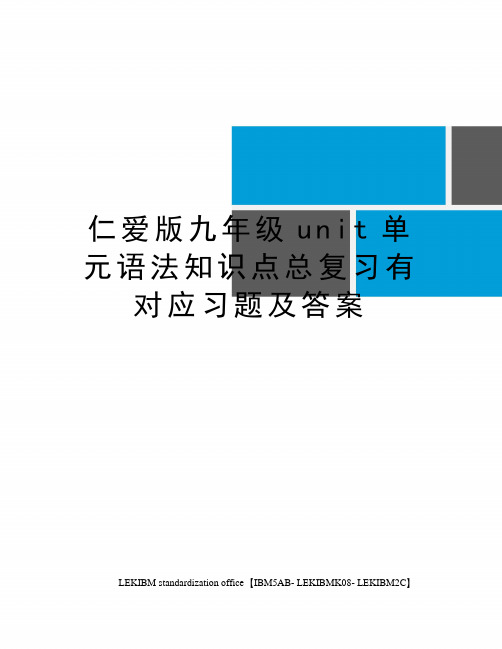
仁爱版九年级u n i t单元语法知识点总复习有对应习题及答案LEKIBM standardization office【IBM5AB- LEKIBMK08- LEKIBM2C】九年级英语Unit1单元归纳复习及相应课堂习题(含每个topic作文)1. Have/has been to, have/has gone to 和 have/has been in的区别主语+have/has been to + 地点“去过某地”(已返回)1 主语+have/has gone to +地点“去了某地”(未回来)主语+have/has been in +地点+for +段时间(待在某地,动作可以延长一定时间,后面常接段的时间)She has been in Japan for 2 year.She has been to Japan. She has gone to Japan.▲地点是名词须接to ,如果地点是副词则不接to。
Tom has been there.▲对地点提问用:where2.频度副词already,yet ,just,ever,never,在现在完成时中的作用3.4.(1)already 用在肯定句,用与句中,句尾均可,“已经”5.I’ve finished my homework already. I’ve already finished my homework .6.(2)yet 用于否定句或疑问句,“还”,用于句末。
在现在完成时的用法中,肯定句常用already,改用否定句和一般疑问句时常把already改为 yet(放句末)。
I have already found him.Have you found him yet(3)Just位于谓语动词前。
“刚刚”(也可以用于一般现在时,过去时态) He has just come back from France.(4) ever 多用与一般疑问句,否定句和条件状语从句中,“曾经”Have you ever been to France No, I haven’t. /Yes,I have.If you ever happen to come here ,be sure to visit us.(5)never 多用于否定的陈述句中,“从不……” (反义词是ever)I have never travelled on a plane.(变成一般疑问句)Have you ever travelled on a plane?He is never late for school. (它还可以用于其他时态中)(6)before 做副词时,”从前“,句中谓语常用现在完成时和过去时。
(仁爱版)七年级英语下册Unit-8语言点归纳

Unit 8知识点总结Topic 1Section A1. 询问天气状况的句型What’s the weather like ……?=How’s the weather……?2. What’s the weather like in spring?在表年、月、季节、上午、下午、傍晚的时间名词前用介词in在具体日期、星期或具体某天的上午、下午、傍晚前用介词on在中午、深夜、具体钟点前用介词at如:in 2009, in February, in fall, in the morning/afternoon/eveningon March 12th, 2009 , on Monday, on tomorrow /Sunday morning, on a rainy afternoonat five o’clock, at noon, at night3.It’s a good season for flying kites.是放风筝的好季节It is + n.+ for doing sth.It’s a good time to climb hills. 是爬山的好时节It is + n.+ to do sth.It is good for helping others,帮助别人是很好的It is + adj + for doing sth.It is difficult to learn English well.学好英语是困难的It is + adj.+ to do sth.4. fly kite 放风筝climb hills 爬山make snowmen 堆雪人5. in spring/ summer/ fall/ winter不加定冠词the6. ---Which season do you like best? ----I like summer best.同义句:----What’s your favorite season? ----My favorite season is summer.7. it’s hard to say很难说8. How’s the weather today?(同义句转换) What’s the weather like today?9. My favorite season is spring.(同义句转换) I like spring best.10. I like swimming because it’s interesting.(划线提问) Why do you like swimming?11. It’s cold in winter.(划线提问) How the weather in winter?Section B1. 怎样询问天气? --What’s the weather like today-- How was the weather yesterday?2. 天气的说法sunny / cloudy / windy / foggy / rainy / snowy / wet / dry / very bright.3.I t’s nice and warm.天气挺暖和的。
仁爱英语九年级上册语法精讲

1.现在完成时的用法:表示过去某一时间发生的动作或存在的状态,对现在仍有影响。
e.g. I have just posted the letter. 我刚把信邮寄了。
She has lost her watch. 她弄丢了手表。
2.现在完成时可以和不明确指出时间的状语连用,如already, yet,just,before, ever, lately, once等。
e.g. Have you heard from your friend lately?你最近收到你朋友的来信了吗?3.现在完成时也可以和包括现在在内的时间状语连用。
如this week, thismorning, today, thisyear等。
e.g. They have moved three times this year. 今年他们已经搬了三次家。
4.现在完成时不能和明确表示过去时间的状语连用。
如yesterday, last week, in 1999, two days ago,just now, when I came in等。
Unit 1-topic3现在完成时(Ⅲ)1.现在完成时表示从过去某一时刻延续到现在的动作或状态,常与for,since引导的状语连用。
for+一段时间,since+过去时间点或从句(从句的谓语动词用过去式)。
e.g. I have lived here for twenty years.我住在这里已有20年了。
We have built many factories since 1985.自1985年以来,我们建了许多工厂。
He has always helped me with my English since he came here.自从他到这里以后,他总是帮助我学习英语。
2.有的动词所表示的动作不是瞬间就可以完成的,要持续一段时间,这样的动词叫延续性动词。
不能延续下去的动词,叫非延续性动词或瞬间动词。
(完整版)仁爱英语九年级上册知识点归纳
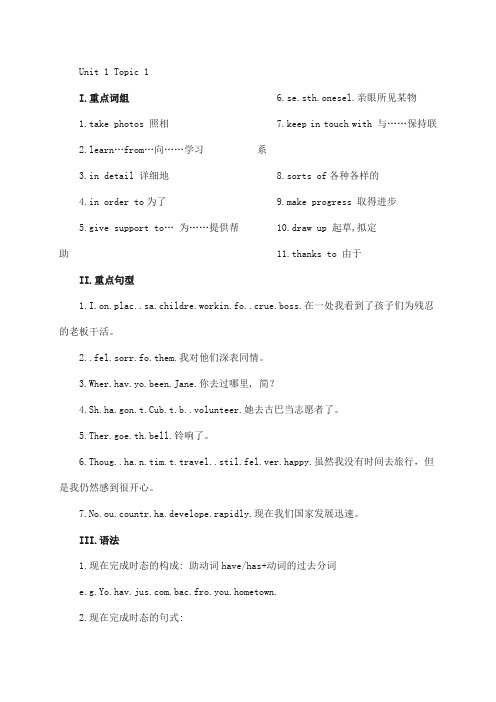
Unit 1 Topic 1I.重点词组1.take photos 照相2.learn…from…向……学习3.in detail 详细地4.in order to为了5.give support to…为……提供帮助6.se.sth.onesel.亲眼所见某物7.keep in touch with 与……保持联系8.sorts of各种各样的9.make progress 取得进步10.draw up 起草,拟定11.thanks to 由于II.重点句型1.I.on.plac..sa.childre.workin.fo..crue.boss.在一处我看到了孩子们为残忍的老板干活。
2..fel.sorr.fo.them.我对他们深表同情。
3.Wher.hav.yo.been.Jane.你去过哪里, 简?4.Sh.ha.gon.t.Cub.t.b..volunteer.她去古巴当志愿者了。
5.Ther.goe.th.bell.铃响了。
6.Thoug..ha.n.tim.t.travel..stil.fel.ver.happy.虽然我没有时间去旅行,但是我仍然感到很开心。
7.No.ou.countr.ha.develope.rapidly.现在我们国家发展迅速。
III.语法1.现在完成时态的构成: 助动词have/has+动词的过去分词.bac.fro.you.hometown.2.现在完成时态的句式:e.g.(1..hav.bee.t.Moun.Huan.wit.m.parents.(2) I haven’t seen him for a long time.(3) Where have you been?(4.——Hav.yo.eve.cleane..room?.——Yes..have..No..haven’t.3.have.ha.been.have/ha.gon.的区别have/has been to sp.表示曾经到过某地—— have/has gone to sp.表示已经去了某地e.g.(1..hav.bee.t.Moun.Huan.wit.m.parents. .(2.Sh.ha.gon.t.Cub.t.b..vo lunteer.Unit 1 Topic 2I.重点词组1. get lost 迷路2. each other 彼此3.at least 至少4take place发生5because of 因为6.b.stric.wit.sb.对某人严格要求.7.carry out 实行8.be short of 缺乏9.take measures to do sth.采取措施做某事10.be known as…作为……而著名11.work well in doing…在……方面起作用12.a couple of 一些13keep up with赶上,跟上II.重点句型1.Hav.yo.foun.hi.yet.你已经找到他了吗?2.——.reall.hat.t.g.shopping.我的确讨厌购物。
仁爱版九年级初三英语上册各单元重要知识点汇总
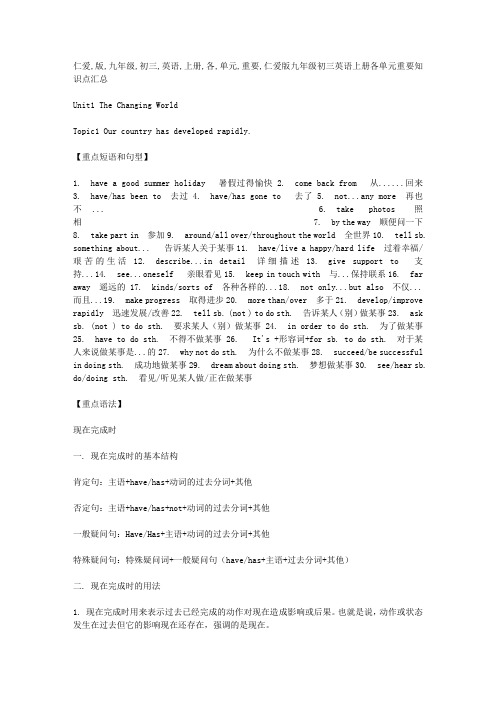
仁爱,版,九年级,初三,英语,上册,各,单元,重要,仁爱版九年级初三英语上册各单元重要知识点汇总Unit1 The Changing WorldTopic1 Our country has developed rapidly.【重点短语和句型】1. have a good summer holiday 暑假过得愉快2. come back from 从......回来3. have/has been to 去过4. have/has gone to 去了5. not...any more 再也不...6. take photos 照相7. by the way 顺便问一下8. take part in 参加9. around/all over/throughout the world 全世界10. tell sb. something about... 告诉某人关于某事11. have/live a happy/hard life 过着幸福/艰苦的生活12. describe...in detail 详细描述13. give support to 支持...14. see...oneself 亲眼看见15. keep in touch with 与...保持联系16. far away 遥远的17. kinds/sorts of 各种各样的...18. not only...but also 不仅...而且...19. make progress 取得进步20. more than/over 多于21. develop/improve rapidly 迅速发展/改善22. tell sb. (not ) to do sth. 告诉某人(别)做某事23. ask sb. (not ) to do sth. 要求某人(别)做某事24. in order to do sth. 为了做某事25. have to do sth. 不得不做某事26. It's +形容词+for sb. to do sth. 对于某人来说做某事是...的27. why not do sth. 为什么不做某事28. succeed/be successful in doing sth. 成功地做某事29. dream about doing sth. 梦想做某事30. see/hear sb. do/doing sth. 看见/听见某人做/正在做某事【重点语法】现在完成时一. 现在完成时的基本结构肯定句:主语+have/has+动词的过去分词+其他否定句:主语+have/has+not+动词的过去分词+其他一般疑问句:Have/Has+主语+动词的过去分词+其他特殊疑问句:特殊疑问词+一般疑问句(have/has+主语+过去分词+其他)二. 现在完成时的用法1. 现在完成时用来表示过去已经完成的动作对现在造成影响或后果。
仁爱九上Unit3Topic3构词法派生词教学设计
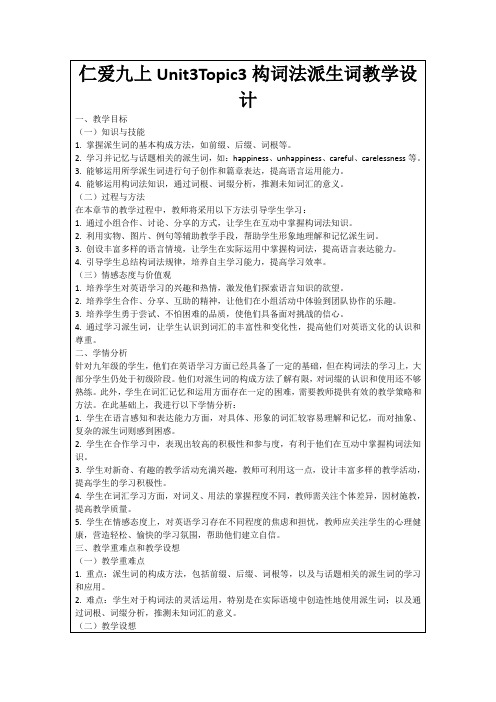
1.介绍派生词的基本构成方法,包括前缀、后缀、词根等,并通过实例进行讲解。
-讲解示例:以单词“happiness”为例,分析其构成元素,即“happy”(词根)+“-ness”(后缀)。
2.指导学生如何通过词根、词缀分析,推测未知词汇的意义。
-讲解示例:展示单词“unhappiness”,让学生根据已学的词根“happy”和前缀“un-”推测词义。
三、教学重难点和教学设想
(一)教学重难点
1.重点:派生词的构成方法,包括前缀、后缀、词根等,以及与话题相关的派生词的学习和应用。
2.难点:学生对于构词法的灵活运用,特别是在实际语境中创造性地使用派生词;以及通过词根、词缀分析,推测未知词汇的意义。
(二)教学设想
1.利用多媒体教学资源,如视频、PPT等,生动形象地展示派生词的构成过程,帮助学生形成直观的认识。
1.单词填空:根据句意,选择合适的派生词填空,如“Please be more ________ when you're driving.”(careful)
2.词语接龙:以小组为单位,进行派生词接龙游戏,要求每个词都必须以派生词的形式出现。
3.造句练习:运用所学派生词,创作句子,描述身边的情景或表达个人情感。
3.讲解与话题相关的派生词,如“careful”、“carelessness”等,并举例说明其在句子中的应用。
-讲解示例:给出例句“Be careful when crossing the road.”,让学生理解“careful”在句子中的作用。
(三)学生小组讨论
在本环节中,我将组织学生进行以下小组活动:
4.能够运用构词法知识,通过词根、词缀分析,推测未知词汇的意义。
仁爱英语九上总复习Review of Unit 3 Topic 3

A: Good afternoon! B: Good afternoon! Which grade are you from A: Welcome to the English corner.1.______________________ ? B: I am from Grade Nine. A: How long have you been learning English? For 6 years B: 2_______________________________. A: Why do you come to the English Corner? Because I want to practice my English here B: 3_____________________________________. A: What advice can you give to the English Corner? Perhaps the English Corner can hold an English Speech. B: 4______________________________________. A: Great.You speak English well. Thank you B: 5______________________________________.
work hard at be afraid of final exam feel like giving up feel sleepy dare to do sth/dare do sth make oneself understood take a deep breath ask sb for help/turn to sb give sb some advice on sth.
仁爱英语九年级上册Unit1-topic3知识点总结
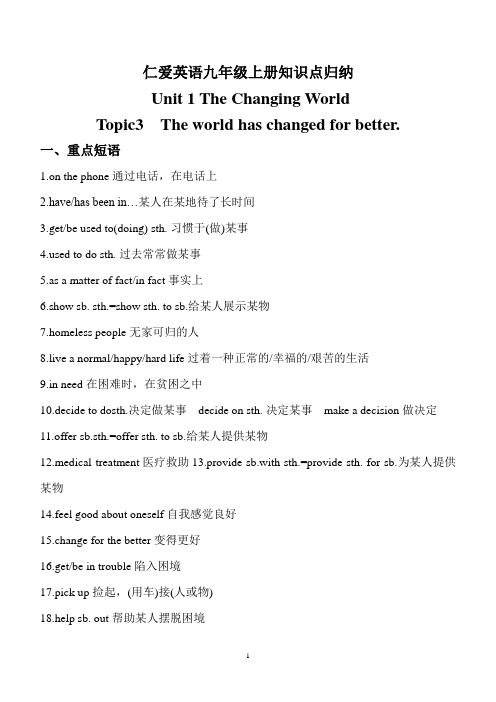
仁爱英语九年级上册知识点归纳Unit 1 The Changing WorldTopic3 The world has changed for better.一、重点短语1.on the phone 通过电话,在电话上2.have/has been in…某人在某地待了长时间3.get/be used to(doing) sth. 习惯于(做)某事ed to do sth. 过去常常做某事5.as a matter of fact/in fact事实上6.show sb. sth.=show sth. to sb.给某人展示某物7.homeless people 无家可归的人8.live a normal/happy/hard life 过着一种正常的/幸福的/艰苦的生活9.in need 在困难时,在贫困之中10.decide to dosth.决定做某事decide on sth. 决定某事make a decision 做决定11.offer sb.sth.=offer sth. to sb.给某人提供某物12.medical treatment 医疗救助13.provide sb.with sth.=provide sth. for sb.为某人提供某物14.feel good about oneself 自我感觉良好15.change for the better 变得更好16.get/be in trouble 陷入困境17.pick up 捡起,(用车)接(人或物)18.help sb. out 帮助某人摆脱困境19.the cause of 导致……的原因the result of ……的结果the reas on for ……的原因20.on purpose 故意21.have a problem with…有……问题22.think of… as…把……视为……23.raise one’s children抚养孩子24.afford sth. for sb. 为某人支付/担负某物 afford to do sth. 担负得起做某事25.make contributions to(doing)sth.在(做)某事方面做出贡献26.as a result 结果27.without th e help of…没有……的帮助lions of 数百万29.according to 据……所说,按……所报道30.plenty of 大量的二、单词转换1.visit v./n.参观,访问,游览 visitor n.参观者,来访者2.chemical adj.化工的,化学的 chemistry n.化学,化学物质3.homeless adj.无家的 homelessness n.无家可归4.treat v.对待,治疗 treatment n.疗法,治疗5.basic adj.基本的,基础的 base n.基础6.important adj.重要的 importance n.重要性,重要三、重点句型1.You have been in New York for a long time.你已经在纽约待了很长时间了。
(完整版)仁爱英语九年级上册知识点归纳
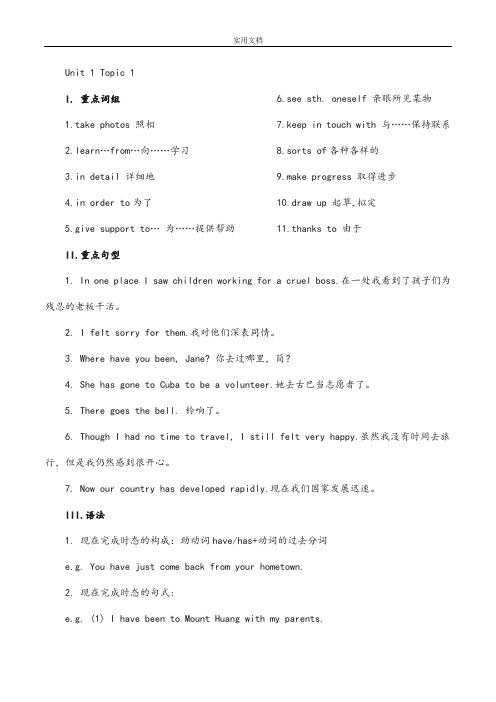
Unit 1 Topic 1I. 重点词组1.take photos 照相2.learn…from…向……学习3.in detail 详细地4.in order to为了5.give support to…为……提供帮助6.see sth. oneself 亲眼所见某物7.keep in touch with 与……保持联系8.sorts of各种各样的9.make progress 取得进步10.draw up 起草,拟定11.thanks to 由于II.重点句型1. In one place I saw children working for a cruel boss.在一处我看到了孩子们为残忍的老板干活。
2. I felt sorry for them.我对他们深表同情。
3. Where have you been, Jane? 你去过哪里,简?4. She has gone to Cuba to be a volunteer.她去古巴当志愿者了。
5. There goes the bell. 铃响了。
6. Though I had no time to travel, I still felt very happy.虽然我没有时间去旅行,但是我仍然感到很开心。
7. Now our country has developed rapidly.现在我们国家发展迅速。
III.语法1. 现在完成时态的构成:助动词have/has+动词的过去分词e.g. You have just come back from your hometown.2. 现在完成时态的句式:e.g. (1) I have been to Mount Huang with my parents.(2) I haven’t seen him for a long time.(3) Where have you been?(4) ——Have you ever cleaned a room? ——Yes, I have. / No, I haven’t.3. have/ has been与 have/has gone 的区别have/has been to sp.表示曾经到过某地—— have/has gone to sp.表示已经去了某地e.g. (1) I have been to Mount Huang with my parents. (2) She has gone to Cuba to be a volunteer.Unit 1 Topic 2I. 重点词组1. get lost 迷路2. each other 彼此3.at least 至少4take place发生5because of 因为6.be strict with sb. 对某人严格要求7.carry out 实行8.be short of 缺乏9.take measures to do sth.采取措施做某事10.be known as…作为……而著名11.work well in doing…在……方面起作用12.a couple of 一些13keep up with赶上,跟上II.重点句型1. Have you found him yet? 你已经找到他了吗?2. ——I really hate to go shopping. 我的确讨厌购物。
九年级英语仁爱版上册 构词法之闯关学前缀

不,否
dis 定
disagree 不同意
disadvantage 劣势、短处
不,非
nonexistent不存在的 nonstop直达的
non
nonmember非成员
nonsmoker不吸烟的人
前缀 含义
例词
错误, misremember 记错
mis 坏
mislead 把…带错路、误导
misunderstand误解;
inbalance
u解nb开u纽tto扣n
ov睡er过sl头eep
im不p礼o貌lite地ly
imbalance
undecide mi读sr错ead dis发co现ver
enc鼓ou励rage mids仲u夏mmer
bi双co色lor
undecided
1. Sandy was __u_n_h_a_p_p_y___ because he failed in the final math exam. (happy)
6.__U_n_l_u_c_k_il_y_, I haven't got enough money to buy the new CDs. (lucky)
Summary
un-, im-, in-, ir-, il-,
non-, dis-, mis-, anti-
a-, re-, en-, ex-, bi-,
kilo- under-
巧连线 remarry century interphone underworld subtitle ex-wife enrich
小标题 地狱
前妻 丰富 世纪 再婚 对讲电话
巧翻译
reuse superstar undersea underwater bi-pass ex-boyfriend
- 1、下载文档前请自行甄别文档内容的完整性,平台不提供额外的编辑、内容补充、找答案等附加服务。
- 2、"仅部分预览"的文档,不可在线预览部分如存在完整性等问题,可反馈申请退款(可完整预览的文档不适用该条件!)。
- 3、如文档侵犯您的权益,请联系客服反馈,我们会尽快为您处理(人工客服工作时间:9:00-18:30)。
英语构词法归纳(义务教育)一、派生法(一)前缀1、表示否定意义的前缀:(1)纯否定前缀:* un- unhappy, unfair, unknown, unhealthy, unlucky* dis- dislike, disagree, disappear* im- impossible, impolite(2)表示错误的意义:* mis- mistake, misunderstanding2、表示空间位置,方向关系的前缀:(1)a- 表示“在……之上”,“向……”:aboard, aside(2)fore- 表示“在前面”:forehead, foreleg(3)inter- 表示“在……间,相互”:international, interaction, internet, interview(4)out- 表示“在外部,在外:”outline, outside, outward(s), outdoor(s)(5)super- 表示“在…..之上,超级”:superhero, superman(6)trans- 表示“移上,转上,在那一边”:translate, transplant, transportation(7)under- 表示“在…..下面,下的”:underline, underground(8)up- 表示“向上,向上面,在上”:upward(s), upload(9)tele- 表示“远离”:television, telephone3、表示时间,序列关系的前缀:(1)mid- 表示“中,中间”:midnight, midsummer, mid-day, mid-autumn(2)re- 表示“再一次,重新”,“回应”:retell, rewrite, reuse, recycle, rebuild, react4、表示某种状态,构成形容词、副词或动词:* a- afraid, alive, alone, asleep, ashamed, aloud, ahead, aside, alike, awake 5、表示“自我”:* self- self-protect(ion), self-made5、表示变换词类作用的前缀:* en- enable, enrich, enlarge, encourage6、表示数量关系的前缀:(1)表示“单一”,“一”:* uni- uniform(2)表示“二,两,双”:* bi- bicycle(3)表示“百,百分之一”:* centi- centimeter(4)表示“千,千分之一”:* kilo- kilometer, kilogram(5)表示“微小、微型”:* mini- minibus, miniskirt(二)后缀1、名词后缀:(1)具有某种职业或动作的人:* -an, -ian, -ician 表示“……地方的人,精通……的人”American, Asian, Australian, Russian, Italian , librarian, musician* -ant,-ent 表示“……人”servant, assistant, agent, student* -eer 表示“从事于……人”engineer, volunteer* -er 表示“从事某种职业的人, 某地区,地方的人”singer, driver, writer, speaker, traveler * -or 表示“……者”doctor, operator, actor, visitor, inventor, educator* -ar, -ary 表示“……的人, 从事……的人”scholar, beggar, secretary*-ese 表示“……国人,……地方的人”Chinese, Japanese* -ess 表示“阴性人称名词”actress, hostess* -ist 表示“从事……研究者,信仰……主义者”dentist, artist(2)构成具有抽象名词的含义:* -age 表示“状态,行为,身份及其结果,总称”courage, marriage* -ance, -ence 表示“性质,状况,行为,过程,总量,程度”importance, appearance, performance, difference, absence, presence* -bility 表示“动作,性质,状态”ability, possibility, probability* -dom 表示“等级,领域,状态”freedom, wisdom* -ery, -ry 表示“行为,状态,习性,性质”bravery, discovery* -hood 表示“资格,身份, 年纪,状态”childhood, girlhood, boyhood* -ing 表示“动作的过程,结果”building, writing, learning* -ion, -tion, -ation, -ition, -sion 表示“行为的过程,结果,状况”action, invention, pronunciation, examination, decision* -ment 表示“行为,状态,过程,手段及其结果”movement, agreement, development * -ness 表示“性质,状态,程度”kindness, illness, happiness* -ship 表示“情况,性质,技巧,技能及身份,职业”relationship, friendship* -th, 表示“动作,性质,过程,状态”truth, growth , youth2、形容词后缀:(1)带有“属性,倾向,相关”的含义:* -able, -ible comfortable, enjoyable, sociable, terrible* -al natural, national* -ant, -ent important, excellent* -ing(表示特征:令人觉得)moving, interesting, exciting* -ed (表示情绪:觉得)pleased, interested, surprised* -ive active, creative, expensive(2)表示“相象,类似”的含义:* -y cloudy, sunny, windy, rainy, foggy, healthy, dirty, lucky, noisy* -ly friendly, lonely, lovely, lively(3)表示“充分的”含义:* -ful beautiful, wonderful, helpful, useful, careful* -ous dangerous, humorous(4)表示由某种物质形成,制成或生产的含义:* -en wooden, golden(5)表示方向的含义:* -ern eastern, eastern, western, southern, northern, southeastern, northwestern* -ward downward, forward(6)表示“数量关系”的含义:* -teen thirteen* -ty fifty* -th fourth, fiftieth(7)表示否定:* -less useless, endless, hopeless3、动词后缀:* -ize, ise 表示“做成,变成,……化”organize, realize* -en 表示“使成为,引起,使有”quicken, weaken, soften, harden4、副词后缀:* -ly possibly, simply, truly* -ward, -wards downward, inwards, upward二、合成法(一)合成名词boyfriend, girlfriend, bus-driver, playground, headmaster, sunshine, notebook, blackboard, firefighter, sportsman, bedroom, reading-room, classroom(二)合成形容词1、名词+动词过去分词:man-made, homemade2、形容词/副词+动词现在分词:easy-going, outgoing3、副词+动词过去分词:well-known4、由三个词构成的合成形容词:two-year-old三、转化法(一)名词→动词hand(手→传递)copy(抄本,复印件→抄写,复印)flood(洪水→淹没)heat(热量→加热)phone(电话→打电话)waste(废物→浪费)face(脸→面对)(二)动词→名词taste(品尝→味道)smell(闻→气味)break(折断→短暂休息)present(礼物→赠送)(三)形容词→动词clean(干净→使干净,打扫)clear(清楚→清理)dirty(脏→弄脏)dry(干燥→烘干,晒干)free(自由→使自由,释放)slow(慢的→放慢)warm(暖和→使暖和)cool(凉的→冷却)quiet(安静→使安静)。
